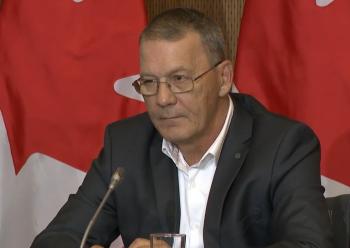Image Caption
Local Journalism Initiative Reporter
Windspeaker.com
Indigenous leaders and representatives from environmental organizations gathered in Montreal on May 26 to denounce plans for the construction of a nuclear waste facility—the Chalk River Nuclear Waste Project.
The Near Surface Disposal Facility (NSDF) would be located close to the Ottawa River, upstream from both Ottawa and Montreal. The facility was originally slated to be completed in 2028, but the project has been delayed by legal challenges.
The Canadian and Quebec governments do not believe the facility would create any significant adverse environmental effects, but those opposing have different views.
“We are speaking today not only for our Nation but for every human being across Ottawa Valley who are watching what is happening and who are determined to make sure it doesn’t happen again,” said Chief Lance Haymond of Kebaowek First Nation in Quebec. “This isn’t just about radioactive waste. It’s about human rights.”
Haymond said the story was shared with the international community at the United Nations Permanent Forum on Indigenous Issues in New York in April.
“We explained that Canada is failing to live up to its own promises,” Haymond said, adding it is violating the United Nations Declaration of Rights for Indigenous Peoples (UNDRIP), which clearly states Indigenous people shall not be subjected to the storage of or disposal of hazardous materials in their lands without their free, prior and informed consent.
“That consent was never given,” said Haymond. “Not by Kewaobek, not by our Nation and not by Anishinaabe people. Canada speaks of reconciliation at the United Nations, but here at home it funds and supports a radioactive dump on our unceded Algonquin territory.”
Haymond said opposition to the project is gaining strength.
“The world is watching,” he said. “And so are Canadians. Reconciliation is more than just words. The governments need to do reconcile-action and actually do something instead of just making empty promises.”
Haymond praised those on the legal team battling against the proposed project.
“But let’s be honest,” he said. “Navigating a colonial court system is not easy. The courts are not built for us or the concerns we bring forward. But this is the system we must use. And we will continue to use them with strength and determination.”
Francis Verreault-Paul, the regional chief for the Assembly of First Nations for Quebec and Labrador, also spoke at the press conference.
Verreault-Paul said it is irresponsible to have radioactive waste so close to the Ottawa River.
“This river is sacred. It’s a source of life for millions of people in Quebec and Ontario, not just for Indigenous people but for everyone,” he said.
The proposed waste facility would see a seven-storey mound with radioactive materials and contaminated soil. Not only would it include waste from the Chalk River crown-owned nuclear lab that is operating now but also waste brought in from other sites in the country.
Verreault-Paul also said any sort of spill from the proposed facility would lead to irreversible consequences.
“It’s a moral fight for future generations,” he said. “Our message is simple. Protect the water. Respect the rights. Reject the NSDF. And above all, respect the UNDRIP.”
Dr. Gordon Edwards, the president of the Canadian Coalition for Nuclear Responsibility, also offered his thoughts on why the nuclear waste facility should be rejected.
“We are totally supportive of the Kewaobek First Nation in having secured these victories in court, calling on the government to revisit their duty with regard to consultations, and with regard to the health and safety of the environment,” he said.
Edwards called on Quebec Premier François Legault to oppose the initiative and also criticized the federal government’s refusal to accept court rulings that have already come down.
Edwards said not to trust those who are organizing the project.
“They say that they will only hold low-level nuclear waste. And they try to present it as it is going to be perfectly safe and harmless. But this is far from the case.”
Edwards agreed that there was plenty of opposition to the facility.
“Quebec is the province most impacted by this waste,” he said. “And Quebec municipalities, 147 of them, have passed resolutions in their town councils expressing grave concern over this project, including all of the Montreal municipalities.”
Edwards said 99 per cent of all the radioactive material that would go into the facility is waste not produced locally. It would be imported from various sites across the country.
Haymond is hoping newly-elected Canadian Prime Minister Mark Carney and his government will take some action.
“This fight is more than about just one site,” he said. “It is about the future of environmental law, the credibility of reconciliation and the rights of Nations to decide what happens on their lands.”
Local Journalism Initiative Reporters are supported by a financial contribution made by the Government of Canada.

